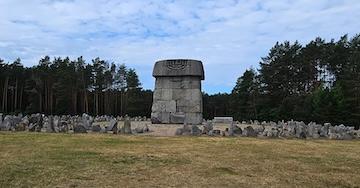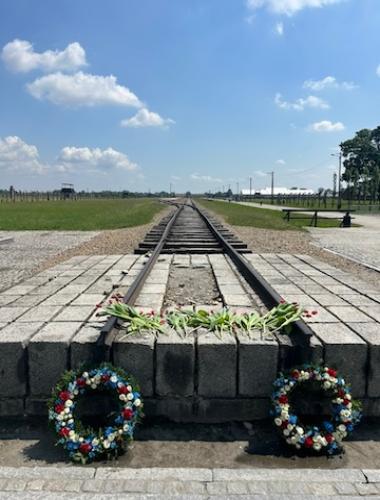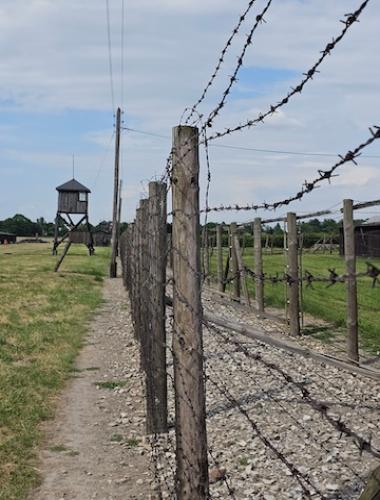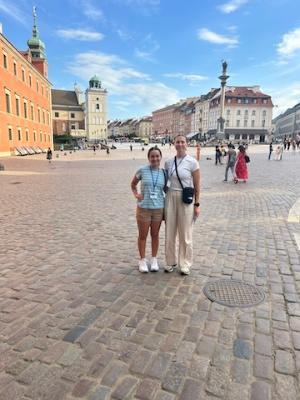Cadets Experience the Horrors of the Holocaust

The memorial at Treblinka consists of thousands of stones of varying sizes symbolizing headstones for the 900,000 victims of the death camp. --Photo courtesy of Sgt. Maj. Tom Sowers.
LEXINGTON, Va. June 27, 2024 — Impactful, challenging, and exposure to atrocities are not ordinary descriptives for a trip to Europe for college students, but cadets at Virginia Military Institute don’t do ordinary. Recently, 18 commissioning cadets and two staff members, Col. David R. Gray, director of the Center for Leadership & Ethics, and Sgt. Maj. Tom Sowers, Institute and Corps sergeant major, traveled to Poland for seven days, arranged through The MirYam Institute, a U.S. based, 501(c)(3), nonprofit.
MirYam was established as a forum for leading Israeli experts of diverse and varied perspectives. MirYam’s program, I-SAP (Israel Strategy & Policy) tour is designed for U.S. military cadets to travel throughout the country, learn about Israel, its place among the nations, and its relationship with the United States.
According to Gray, the ongoing Israel-Hamas war curtailed a visit to Israel with MirYam this year. Instead, a trip to Poland was arranged for cadets to learn about the Nazi Final Solution and its malevolent execution during the Holocaust.
“After we had walked around Majdanek concentration camp, we conducted a short ceremony to commemorate the victims. I was asked to say a few words to close out the ceremony. I chose a quote from political philosopher John Stuart Mill who wrote about the preservation of liberty from tyranny. ‘Let not anyone pacify his conscience by the delusion that he can do no harm if he takes no part and forms no opinion. Bad men need nothing more to compass their ends, than that good men should look on and do nothing. He is not a good man who, without a protest, allows wrong to be committed in his name, and with the means which he helps to supply, because he will not trouble himself to use his mind on the subject.’ We all have the ability to choose. Choose courage over comfort! Choose the harder right over the easier wrong! Choose to be a good man or woman in the face of evil!” declared Gray.


Flowers and wreaths lie in honor of those who lost their lives, Barbed wire fences still stand at Majdanek death camp.
following a memorial ceremony at Auschwitz. (Photo courtesy of Sgt. Maj. Tom Sowers)
(Photo courtesy of Delilah Martindale '25)
Delilah Martindale ’25, an international studies major from San Francisco, California, stated that throughout the trip there was an importance placed on the cadets’ development as future military leaders. “It was strongly emphasized that the future of America, and the world for that matter, depends on us and our morals, values, and beliefs. The purpose of the trip was to teach us about the atrocities so we can prevent them from happening again, while opening our eyes to a completely different perspective than what we have been taught in our history classes. The destinations we went, every death camp and museum we visited, every debate or lecture we had as a group, were very uncomfortable, but in the best way possible that challenges you and your beliefs to learn even more, and to fight for what you believe is morally right,” she said.
Sowers observed that exposing the cadets to the horrors of the Holocaust will affect how they will lead in the future. “Watching the cadets experience the horrors of mankind was something that wasn’t enjoyable, but it was good for them to see in order to learn from that chapter of history. Their emotional responses were real,” he said. For himself though, the part of the trip that made that biggest impact on Sowers, was getting to know an Israeli who accompanied the group. “Izhar Lifachitz is a living illustration of the state of Israel. His parents were kidnapped on the fateful day of October 7, 2023. His mother has been released, but his father in still one of the hostages held by Hamas. The week he was with us, his son was swearing into the Israeli Defense Force at the Wailing Wall in Jerusalem. This is the story of Israel, from generation to generation. To quote poet William Ernest Henley, ‘bloody but unbowed.’”
For Jonah Sporleder ’27, a history major from Effingham, Illinois, the trip offered a better understanding of the Jewish culture and their perspective of the world. “Learning about the Holocaust in the first person made me realize just how horrible it was. Despite being educated and taught about the Holocaust in high school, being able to be see the camps and ghettos in person is entirely different. Seeing the gas chambers and the conditions in which the Jews were expected to live is horrifying. The trip didn’t change my perspective on anything, it just fortified my beliefs,” shared Sporleder.
Marianne Hause
Photos courtesy of Delilah Martindale ’25 and Sgt. Maj. Tom Sowers
Communications & Marketing
VIRGINIA MILITARY INSTITUTE
.svg)
.png)